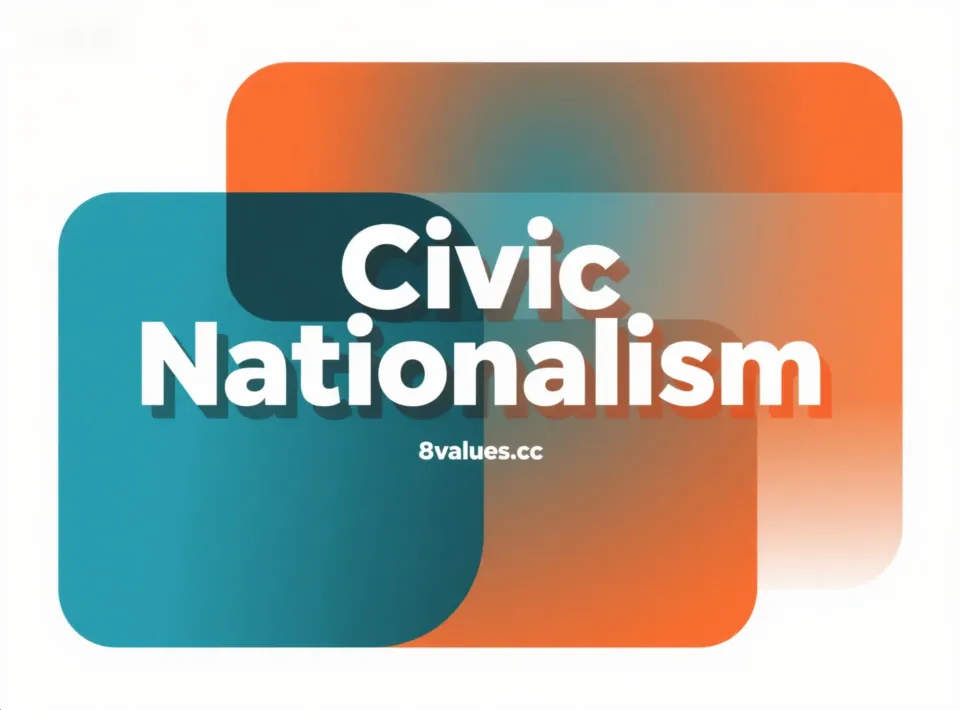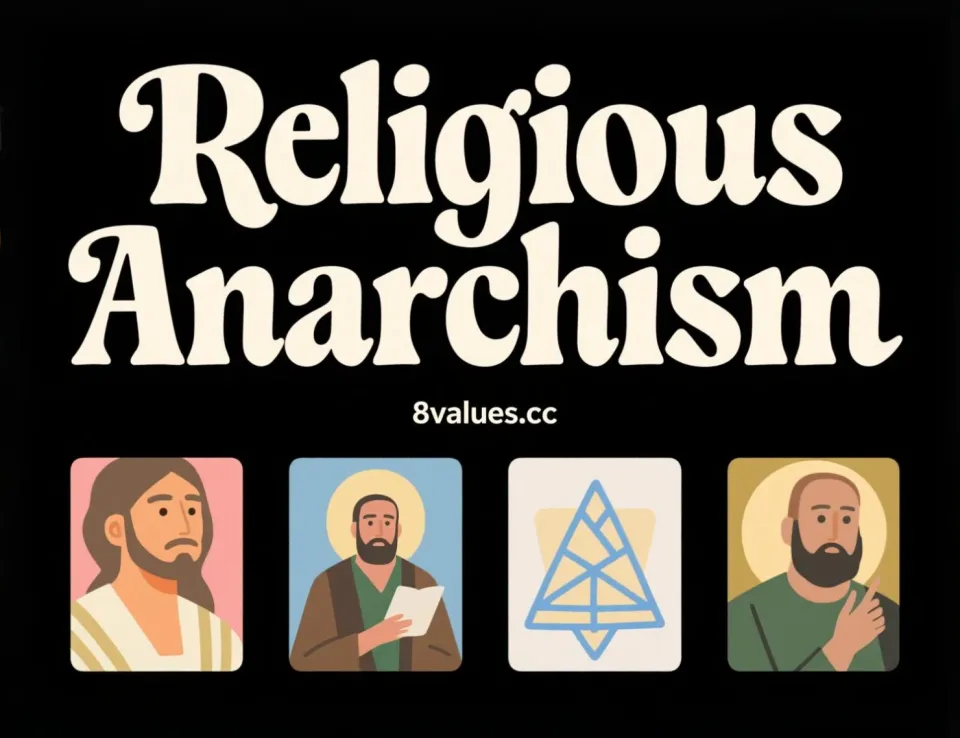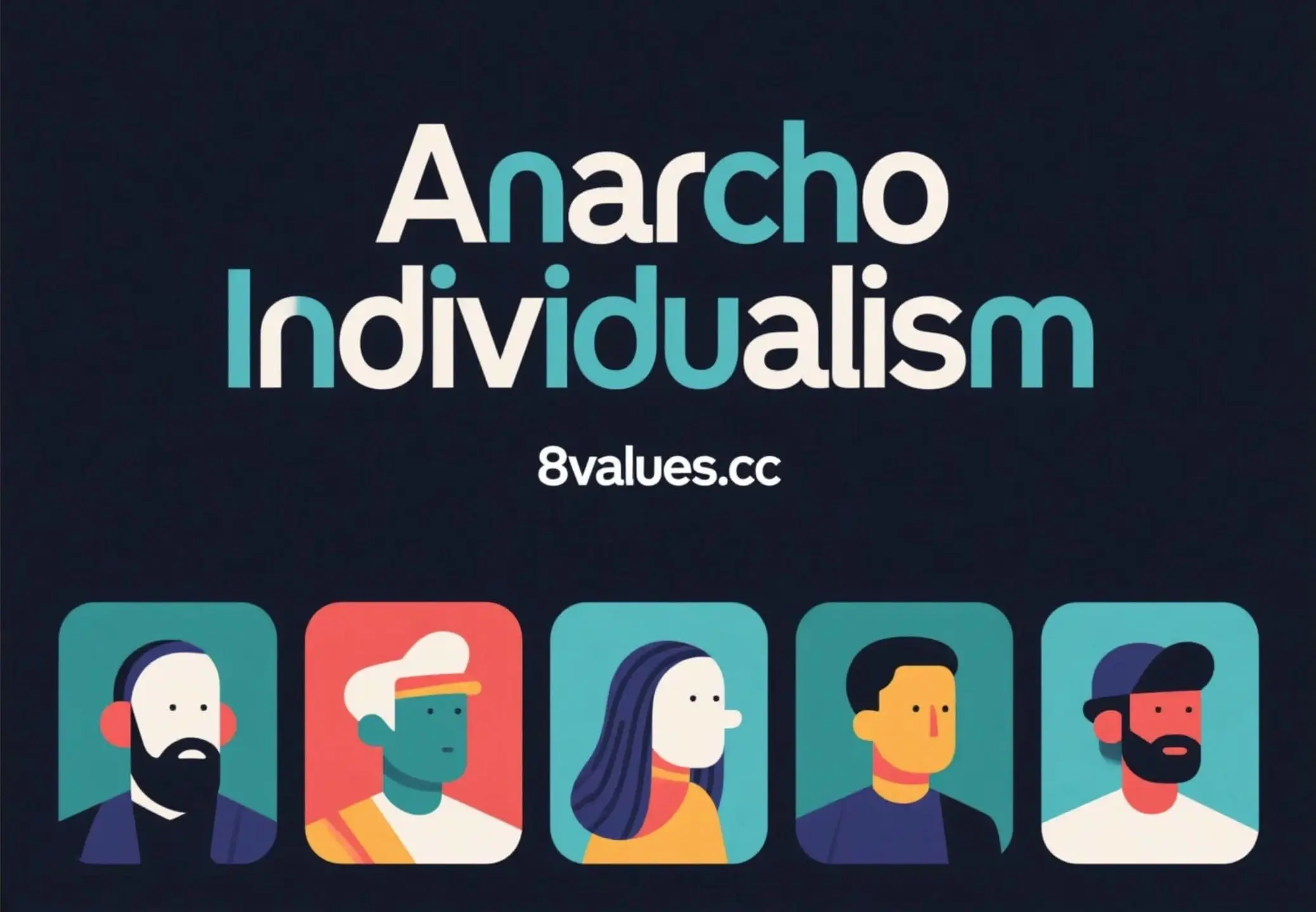การตีความเชิงลึกเกี่ยวกับอุดมการณ์ทางการเมืองของลัทธิชาตินิยมของพลเมือง
ลัทธิชาตินิยมของพลเมืองเป็นรูปแบบหนึ่งของอัตลักษณ์ประจำชาติที่มีศูนย์กลางอยู่ที่ความเป็นพลเมืองร่วมกันและค่านิยมทางการเมือง โดยเน้นที่เสรีภาพ ประชาธิปไตย หลักนิติธรรม และความครอบคลุม ตรงกันข้ามกับลัทธิชาตินิยมทางชาติพันธุ์ที่มีพื้นฐานมาจากบรรพบุรุษและวัฒนธรรม ความเข้าใจเชิงลึกเกี่ยวกับต้นกำเนิดหลักการสำคัญและความท้าทายร่วมสมัยของลัทธิชาตินิยมของพลเมืองจะช่วยวิเคราะห์แนวโน้มทางอุดมการณ์ของค่านิยมทางการเมืองในสังคมพหุนิยมสมัยใหม่
ในฐานะแพลตฟอร์มระดับมืออาชีพสำหรับการสำรวจอุดมการณ์และค่านิยมทางการเมือง เว็บไซต์อย่างเป็นทางการของการทดสอบอุดมการณ์ทางการเมืองแบบทดสอบ 8Values ให้ บริการทดสอบฟรีสำหรับค่านิยมทางการเมืองที่ได้รับความนิยม แนวโน้มทางอุดมการณ์ และช่วยให้คุณกำหนดจุดยืนทางการเมืองส่วนบุคคลของคุณได้อย่างแม่นยำ บทความนี้จะอธิบายรายละเอียดเสาหลักสำคัญทางทฤษฎีประการหนึ่งของอัตลักษณ์ชาติสมัยใหม่ - ลัทธิชาตินิยมของพลเมือง
ลัทธิชาตินิยมของพลเมืองหรือที่รู้จักกันในชื่อ ลัทธิชาตินิยมเสรีนิยม หรือ ลัทธิชาตินิยมประชาธิปไตย เป็นรูปแบบหนึ่งของลัทธิชาตินิยมที่มีเอกลักษณ์ทางการเมืองเป็นแกนหลัก อุดมการณ์นี้เชื่อว่าประชาคมระดับชาติตั้งอยู่บนพื้นฐานของความภักดีและการระบุตัวตนของพลเมืองทุกคนต่อระบบของประเทศ กฎหมาย และค่านิยมทางการเมืองที่มีร่วมกัน แทนที่จะเป็นคุณลักษณะโดยธรรมชาติ เช่น เลือด เชื้อชาติ หรือวัฒนธรรม
หลักการและลักษณะสำคัญของลัทธิชาตินิยมของพลเมือง
แกนหลักของลัทธิชาตินิยมของพลเมืองคือการเชื่อมโยงอัตลักษณ์ของชาติเข้ากับความเป็นพลเมืองอย่างใกล้ชิด ซึ่งเป็นพื้นฐานสำหรับการสร้างชุมชนทางสังคมและการเมืองที่ทันสมัยและมีความหลากหลาย
แบ่งปันค่านิยมทางการเมืองและสัญญาทางแพ่ง
รากฐานของลัทธิชาตินิยมของพลเมืองคือ ชุดค่านิยมและอุดมคติทางการเมืองที่ใช้ร่วมกัน ค่านิยมหลักเหล่านี้มักประกอบด้วย:
- เสรีภาพ ความอดทน ความเสมอภาค และสิทธิส่วนบุคคล : ลัทธิชาตินิยมของพลเมืองรวบรวมคุณค่าดั้งเดิมของลัทธิเสรีนิยม
- หลักประชาธิปไตยและหลักนิติธรรม : เน้นความภักดีและการเคารพต่อรัฐธรรมนูญ ระบบกฎหมาย และกระบวนการทางประชาธิปไตยของประเทศ ระบบกฎหมายเป็นรากฐานสำคัญของความสามัคคีในชาติ และพลเมืองทุกคนมีความเท่าเทียมกันภายใต้กฎหมาย
ลัทธิชาตินิยมของพลเมืองถือว่าความสามัคคีในระดับชาติมาจากความมุ่งมั่นโดยสมัครใจของพลเมืองและการสนับสนุน สถาบันทางการเมืองและหลักการเสรีนิยม เหล่านี้ ความเป็นพลเมืองแสดงถึงความเชื่อมโยงอย่างเป็นทางการระหว่างบุคคลกับรัฐ และให้สิทธิต่างๆ แต่ยังกำหนดให้พลเมืองต้องปฏิบัติตามพันธกรณี เช่น การมีส่วนร่วมในกิจการสาธารณะและการเคารพกฎหมาย
ความเปิดกว้าง การไม่แบ่งแยก และความหลากหลายทางวัฒนธรรม
คุณลักษณะที่ยิ่งใหญ่ที่สุดของลัทธิชาตินิยมของพลเมืองคือ การไม่แบ่งแยก ตามทฤษฎีแล้ว ใครก็ตามที่แบ่งปันค่านิยมและกรอบทางการเมืองร่วมกันเหล่านี้ สามารถเป็นสมาชิกของประเทศได้โดยผ่านขั้นตอนที่กำหนดไว้ (เช่น การยื่นขอสัญชาติ) โดยไม่คำนึงถึงเชื้อชาติ ศาสนา หรือสถานที่เกิด สมาชิกแบบเปิดนี้มักจะสะท้อนให้เห็นในระบบการให้สัญชาติ แบบ jus\ soli$ โดยที่ทุกคนที่เกิดในอาณาเขตของรัฐจะถือเป็นพลเมืองและสมาชิกของประเทศ
โมเดลนี้ มีพื้นที่สำหรับความหลากหลายทางวัฒนธรรมและชาติพันธุ์ เนื่องจากอัตลักษณ์ของชาติตั้งอยู่บนพื้นฐานของค่านิยมทางการเมืองมากกว่าภูมิหลังทางวัฒนธรรม พลเมืองจึงสามารถรักษามรดกทางวัฒนธรรมของตนไว้ได้ในขณะที่เพลิดเพลินกับการเป็นสมาชิกระดับชาติเต็มรูปแบบในฐานะพลเมือง ลัทธิชาตินิยมของพลเมืองมีแนวโน้มที่จะสนับสนุนนโยบายของลัทธิพหุวัฒนธรรม ซึ่งก็คือการยอมรับความแตกต่างทางวัฒนธรรม ศาสนา และภาษาภายในกรอบของความภักดีทางการเมืองที่มีร่วมกัน
ต้นกำเนิดทางอุดมการณ์และพัฒนาการทางประวัติศาสตร์ของลัทธิชาตินิยมของพลเมือง
ต้นกำเนิดอุดมการณ์ของลัทธิชาตินิยมพลเมืองสามารถย้อนกลับไปถึงยุค ตรัสรู้ (ศตวรรษที่ 17-18) โดยเฉพาะอย่างยิ่งการเน้นที่เหตุผล สิทธิส่วนบุคคล และอธิปไตยของประชาชน
ทฤษฎีการตรัสรู้และสัญญาสังคม
แนวคิดนี้เชื่อมโยงอย่างใกล้ชิดกับประเพณีนิยมเหตุผลและเสรีนิยม ในหมู่พวกเขา นักปรัชญาชาวฝรั่งเศส ฌอง-ฌาค รุสโซ ถือเป็นหนึ่งในผู้บุกเบิกอุดมการณ์ที่สำคัญของเขา "ทฤษฎีสัญญาทางสังคม" ของเขาเน้นย้ำว่าความชอบธรรมทางการเมืองของประเทศมาจากการมีส่วนร่วมอย่างแข็งขันของพลเมืองและ "เจตจำนงทั่วไป" (เจตจำนงทั่วไป)
“การลงประชามติรายวัน” และการตัดสินตนเองของชาติ
นักปรัชญาชาวอังกฤษ จอห์น สจ๊วต มิลล์ และนักปรัชญาการเมืองชาวฝรั่งเศส เออร์เนสต์ เรนัน มักถูกอ้างถึงว่าเป็นผู้ชาตินิยมพลเมืองในยุคแรกๆ
Renan ในการบรรยายอันโด่งดังของเขาในปี 1882 เรื่อง "What is a Nation?" " (_Qu'est-ce qu'une nation?_) ให้คำจำกัดความคลาสสิกของชาติโดยสมัครใจ: ประเทศคือ "การลงประชามติรายวัน" โดยยึดตาม "ความตั้งใจที่จะอยู่ร่วมกัน" ในหมู่สมาชิก คำจำกัดความนี้เน้นย้ำว่าอัตลักษณ์ประจำชาติเป็นผลมาจาก เจตจำนงส่วนตัวของบุคคล แทนที่จะถูกกำหนดโดยเงื่อนไขที่เป็นวัตถุประสงค์ เช่น เลือดหรือภาษา
อุดมคติของลัทธิชาตินิยมของพลเมืองมีอิทธิพลโดยตรงต่อการพัฒนาระบอบประชาธิปไตยแบบมีผู้แทน ตัวอย่างเช่น
- สหรัฐอเมริกา : คำประกาศอิสรภาพปี 1776 และรัฐธรรมนูญของสหรัฐอเมริกาได้กำหนดอัตลักษณ์ประจำชาติโดยอิงตามสิทธิส่วนบุคคล เสรีภาพ และคุณค่าทางประชาธิปไตย ทำให้คำประกาศนี้เป็นตัวอย่างคลาสสิกของลัทธิชาตินิยมของพลเมืองในการดำเนินการ
- ฝรั่งเศส : คำประกาศสิทธิของมนุษย์และพลเมือง พ.ศ. 2332 เป็นการแสดงออกถึงแนวคิดเรื่องลัทธิชาตินิยมพลเมืองโดยเน้นความเท่าเทียมกันของพลเมืองทุกคนภายใต้กฎหมาย
ชาตินิยมของพลเมืองและชาตินิยมทางชาติพันธุ์: การต่อต้านแบบไบนารี่ของค่านิยมทางการเมือง
ในสาขาอุดมการณ์ทางการเมือง ลัทธิชาตินิยมของพลเมืองมักจะอยู่ตรงข้ามกับ ลัทธิชาตินิยมทางชาติพันธุ์ นี่เป็นหนึ่งในมิติหลักที่แตกต่างของเครื่องมือวิเคราะห์ เช่น การทดสอบการวางแนวทางการเมืองค่านิยม 8 ประการ และ การทดสอบการวางแนวเชิงอุดมการณ์คุณค่าทางการเมืองอื่น ๆ ความแตกต่างแบบคลาสสิกนี้จัดระบบโดยนักปรัชญา ฮานส์ โคห์น ในปี พ.ศ. 2487 ได้แยกแยะลัทธิชาตินิยมทางการเมืองแบบตะวันตกออกจากลัทธิชาตินิยมแบบลำดับวงศ์ตระกูลตะวันออก
| มิติความคมชัด | ชาตินิยมของพลเมือง | ชาตินิยมทางชาติพันธุ์ |
|---|---|---|
| พื้นฐานอัตลักษณ์ | อัตลักษณ์ทางการเมือง (ความเป็นพลเมือง กฎหมาย คุณค่าตามรัฐธรรมนูญ) | คุณลักษณะโดยกำเนิด (เลือด เชื้อชาติ ภาษา ศาสนา วัฒนธรรมดั้งเดิม) |
| สมาชิกภาพ | เปิด ทางเลือกโดยสมัครใจ ได้มา | ความพิเศษเฉพาะตัวที่แข็งแกร่ง การตัดสินใจโดย กำเนิด มรดก |
| แหล่งที่มาของความชอบธรรมของรัฐ | เจตจำนงร่วมกันของพลเมืองและอัตลักษณ์สถาบัน | แบ่งปันประวัติศาสตร์ชาติพันธุ์และมรดกทางวัฒนธรรม |
| แนวโน้มทางอุดมการณ์ | เสรีนิยม, สากลนิยม | อนุรักษนิยม, อนุรักษ์นิยม |
| การปฏิบัติโดยทั่วไป | ลัทธิอาณาเขต | แค่ sanguinis |
ลัทธิชาตินิยมทางชาติพันธุ์ ถือว่าความอยู่รอดของประเทศขึ้นอยู่กับสายสัมพันธ์ทางสายเลือด และถือว่าความเชื่อและ/หรือภาษาที่มีร่วมกันเป็นองค์ประกอบทางวัฒนธรรมที่สำคัญ ในทางตรงกันข้าม ลัทธิชาตินิยมของพลเมืองสร้างอัตลักษณ์ของชาติผ่าน ความเป็นพลเมืองและหลักการทางการเมืองที่มีร่วมกัน
อย่างไรก็ตาม แวดวงวิชาการโดยทั่วไปยอมรับว่าความแตกต่างแบบไบนารีนี้มักเป็น แบบจำลองในอุดมคติทางทฤษฎี ในความเป็นจริง รัฐชาติส่วนใหญ่มีทั้งสัญชาติและเชื้อชาติรวมกัน ตัวอย่างเช่น ในอดีตสหรัฐอเมริกาถูกมองว่าเป็นรัฐชาติที่เป็นพลเมืองที่สำคัญ แต่การก่อตั้งสหรัฐฯ ก็มีนโยบายกีดกันที่พิจารณาจากเชื้อชาติและเพศด้วย
เพื่อวิเคราะห์แนวโน้มอุดมการณ์ทางการเมืองของคุณให้ลึกซึ้งยิ่งขึ้น คุณสามารถลองทำแบบทดสอบที่มีรายละเอียดมากขึ้น เช่น แบบทดสอบอุดมการณ์ทางการเมือง 9Axes ซึ่งสามารถช่วยให้คุณเข้าใจจุดตัดของอุดมการณ์ที่แตกต่างกันจากมิติที่หลากหลายมากขึ้น
ความท้าทายด้านการปฏิบัติและการบูรณาการของลัทธิชาตินิยมของพลเมืองในประเทศสมัยใหม่
ลัทธิชาตินิยมของพลเมืองมีบทบาทสำคัญในสังคมพหุชาติพันธุ์ โดยมีเป้าหมายเพื่อให้เกิดความสามัคคีทางสังคมและเสถียรภาพทางการเมืองผ่านอัตลักษณ์ร่วมกันที่ก้าวข้ามขอบเขตทางชาติพันธุ์
ส่งเสริมความสามัคคีทางสังคม
ลัทธิชาตินิยมของพลเมืองส่งเสริมการบูรณาการทางสังคมโดยเน้นย้ำถึงค่านิยมทางการเมืองที่มีร่วมกัน และจัดทำ กรอบการทำงานร่วมกัน สำหรับพลเมืองที่มีภูมิหลังทางวัฒนธรรม ศาสนา และชาติพันธุ์ที่แตกต่างกัน ตัวอย่างเช่น สหรัฐอเมริกาเชื่อมโยงประชากรที่หลากหลายเข้ากับชุมชนการเมืองผ่าน American Creed ตัวอย่างเช่น ในสหราชอาณาจักร ในระหว่างการเคลื่อนไหวเพื่อเอกราชของสกอตแลนด์ พรรคแห่งชาติสก็อตแลนด์ (SNP) สนับสนุนอย่างชัดเจนว่าลัทธิชาตินิยมของพรรคนั้นเป็นลัทธิชาตินิยมของพลเมือง โดยเน้นย้ำความผูกพันโดยสมัครใจของสมาชิกกับสกอตแลนด์และการมีส่วนร่วมในชีวิตพลเมือง ด้วยเหตุนี้จึงได้รับการสนับสนุนจากผู้อยู่อาศัยที่ไม่ใช่ชาวสก็อต
ความรักชาติตามรัฐธรรมนูญและการบูรณาการของผู้อพยพใหม่
นักปรัชญาชาวเยอรมัน เจอร์เกิน ฮาเบอร์มาส ได้พัฒนาแนวคิดเรื่อง "ความรักชาติตามรัฐธรรมนูญ" ซึ่งเกี่ยวข้องอย่างใกล้ชิดกับลัทธิชาตินิยมของพลเมือง ฮาเบอร์มาสแย้งว่าผู้อพยพ ไม่จำเป็นต้องหลอมรวมเข้ากับวัฒนธรรมที่โดดเด่นอย่างสมบูรณ์ เพื่อรวมเข้ากับประเทศประชาธิปไตยเสรีนิยม แต่เพียงต้องยอมรับหลักการตามรัฐธรรมนูญและค่านิยมหลักของประเทศเท่านั้น นี่เป็นพื้นฐานทางทฤษฎีสำหรับประเทศผู้อพยพหลายเชื้อชาติ (เช่น สหรัฐอเมริกา แคนาดา และฝรั่งเศส) เพื่อรักษาอัตลักษณ์ประจำชาติในขณะเดียวกันก็รับประกันความหลากหลายทางวัฒนธรรม
อ่านเพิ่มเติม: จุดยืนในสเปกตรัมทางการเมือง
หากคุณต้องการที่จะเข้าใจตำแหน่งของลัทธิชาตินิยมของพลเมืองในขอบเขตทางการเมืองที่กว้างขึ้นและความสัมพันธ์กับจุดยืนทางเศรษฐกิจ (เช่นกับ ลัทธิทุนนิยมสีรุ้ง แนวโน้มที่จะรวมคุณค่าทางสังคมที่ก้าวหน้ากับตลาดเสรีที่แสดงโดยทุนนิยมสีชมพู) ขอแนะนำให้คุณปรับแต่งการวิเคราะห์ของคุณผ่าน การทดสอบค่านิยมทางการเมืองฝ่ายซ้ายของ LeftValues และ การทดสอบสเปกตรัมทางการเมืองของฝ่ายขวาของ RightValues เพื่อทำความเข้าใจคุณค่าทางการเมืองและแนวโน้มทางอุดมการณ์ที่อยู่เบื้องหลังอย่างถ่องแท้
ข้อโต้แย้งทางทฤษฎีและความท้าทายเชิงปฏิบัติของลัทธิชาตินิยมของพลเมือง
แม้ว่าลัทธิชาตินิยมแบบพลเรือนจะถูกมองว่าเป็นรูปแบบชาตินิยมที่ครอบคลุมและก้าวหน้ามากขึ้น แต่ก็ต้องเผชิญกับความท้าทายหลายประการทั้งทางทฤษฎีและการปฏิบัติ
ภาพลวงตาของ "ความเป็นกลางทางวัฒนธรรม"
นักวิจารณ์เชื่อว่า "ความเป็นกลางทางวัฒนธรรม" และ "อัตลักษณ์ทางการเมืองที่บริสุทธิ์" ที่ได้รับการส่งเสริมโดยลัทธิชาตินิยมของพลเมืองนั้นเป็น มายาคติ
- อคติทางชาติพันธุ์โดยนัย : นักวิชาการบางคนชี้ให้เห็นว่า "ค่านิยมร่วม" ของลัทธิชาตินิยมของพลเมืองมักมีต้นกำเนิดมาจากการพัฒนาทางประวัติศาสตร์และวัฒนธรรมของวัฒนธรรมที่มีอำนาจเหนือกว่าหรือกลุ่มที่มีอำนาจ และดังนั้นจึงอาจมี อคติทางชาติพันธุ์โดยปริยาย ตัวอย่างเช่น ในออสเตรเลีย วาทกรรมที่เรียกว่า "ชาตินิยมของพลเมือง" ถือเป็น ลัทธิชาตินิยมทางชาติพันธุ์ซึ่งปลอมตัวเป็นลัทธิชาตินิยมของพลเมือง โดยกำหนดให้ผู้อพยพต้องซึมซับและยึดมั่นในคุณค่าทางวัฒนธรรมประชาธิปไตยเสรีนิยมของตะวันตก
- องค์ประกอบทางวัฒนธรรมเป็นสิ่งที่หลีกเลี่ยงไม่ได้ : เบอร์นาร์ด ยัค นักรัฐศาสตร์ชาวแคนาดา วิพากษ์วิจารณ์แนวคิดของ Renan ที่ว่าด้วยพลเมืองแบบ "สมัครใจ" ว่าเป็น ภาพลวงตา โดยให้เหตุผลว่าความทรงจำทางวัฒนธรรมเป็นส่วนสำคัญของอัตลักษณ์ทางการเมืองของประเทศใดๆ แม้แต่ในกรณีที่เป็นตัวอย่างเช่นสหรัฐอเมริกาและฝรั่งเศส กระบวนการสร้างชาติก็มี องค์ประกอบทางวัฒนธรรมที่สำคัญ
การยกเว้นค่านิยมและองค์ประกอบของ “เสรีนิยมใหม่”
ในการใช้งานจริง การเน้นที่ "คุณค่าร่วมกัน" อาจนำไปสู่การยกเว้นรูปแบบใหม่
- ความเสี่ยงของการกีดกัน : การวิจัยทางสังคมวิทยาการเมืองแสดงให้เห็นว่าในบางประเทศในยุโรปตะวันตกเฉียงเหนือ (เช่น เนเธอร์แลนด์ เดนมาร์ก) ลัทธิชาตินิยมของพลเมือง (โดยเฉพาะอย่างยิ่งเมื่อรวมกับองค์ประกอบทางวัฒนธรรม เช่น ความสามารถทางภาษา) มีความสัมพันธ์กับ ทัศนคติต่อต้านมุสลิมที่เข้มแข็งขึ้น ในบริบทนี้ ค่านิยมเสรีนิยม (เช่น ความเสมอภาคทางเพศ ฆราวาสนิยม) จะถูกทำให้เป็นการเมืองและกลายเป็น อาวุธของการกีดกันทางวัฒนธรรม โดยกำหนดเป้าหมายไปที่กลุ่มที่มีค่านิยมที่ถือว่าไม่สอดคล้องกับ “อารยธรรมตะวันตก”
- เงื่อนไขของเสรีนิยมใหม่ : นักวิชาการบางคนได้ชี้ให้เห็นว่า องค์ประกอบเสรีนิยมใหม่ ได้ปรากฏในนโยบายบูรณาการผู้อพยพในประเทศตะวันตกเมื่อเร็ว ๆ นี้ นโยบายเหล่านี้มักเรียกกันว่า "การบูรณาการของพลเมือง" องค์ประกอบเสรีนิยมใหม่นี้สะท้อนให้เห็นใน "เงื่อนไข" ของใบอนุญาตมีถิ่นที่อยู่ และการได้มาซึ่งสัญชาติโดยยึดตาม "คุณค่า" และ "บุญคุณ"
ความเสี่ยงของการปฏิบัติขั้นสูงสุด: สู่ลัทธิเผด็จการ?
หากใช้เหตุผลอย่างสุดโต่งอย่างเคร่งครัด โดยที่ประชาชนต้องปฏิบัติตาม "ค่านิยมหลัก" ที่เป็นนามธรรมอย่างต่อเนื่อง สิ่งนี้อาจนำไปสู่ การทดสอบทางอุดมการณ์ และ การสอดแนมทางการเมืองอย่างต่อเนื่อง ซึ่งอาจหว่าน เมล็ดพันธุ์แห่งลัทธิเผด็จการ ได้ ในสถานการณ์สมมติดังกล่าว ประเทศจะต้องจัดตั้งรัฐตำรวจขนาดใหญ่เพื่อดำเนินการทบทวนอุดมการณ์อย่างต่อเนื่องเพื่อให้แน่ใจว่า “ค่านิยม” ของพลเมืองจะไม่เปลี่ยนแปลง สิ่งนี้ ขัดแย้งโดยธรรมชาติ กับเสรีภาพส่วนบุคคลและหลักนิติธรรมที่ลัทธิชาตินิยมพลเมืองอ้างว่าปกป้อง
ลัทธิชาตินิยมของพลเมืองจึงไม่ใช่แนวคิดที่คงที่ แต่เป็น โครงการทางการเมืองที่มีพลวัตและมีการโต้แย้ง ความสำเร็จขึ้นอยู่กับว่าประเทศสามารถเคารพและยอมรับความหลากหลายทางวัฒนธรรมได้อย่างแท้จริงในขณะเดียวกันก็แสวงหาความสามัคคีในชาติหรือไม่
ด้วยการอัปเดตเนื้อหาอย่างต่อเนื่องของ บล็อกอย่างเป็นทางการ เราหวังว่าจะนำเสนอการวิเคราะห์อย่างมืออาชีพมากขึ้นเกี่ยวกับปรัชญาการเมืองและ คุณค่าทางการเมือง การทดสอบแนวโน้มทางอุดมการณ์ และช่วยให้สาธารณชนสร้างความเข้าใจอย่างลึกซึ้งและความตระหนักรู้ที่ชัดเจนในโลกการเมืองที่หลากหลาย






